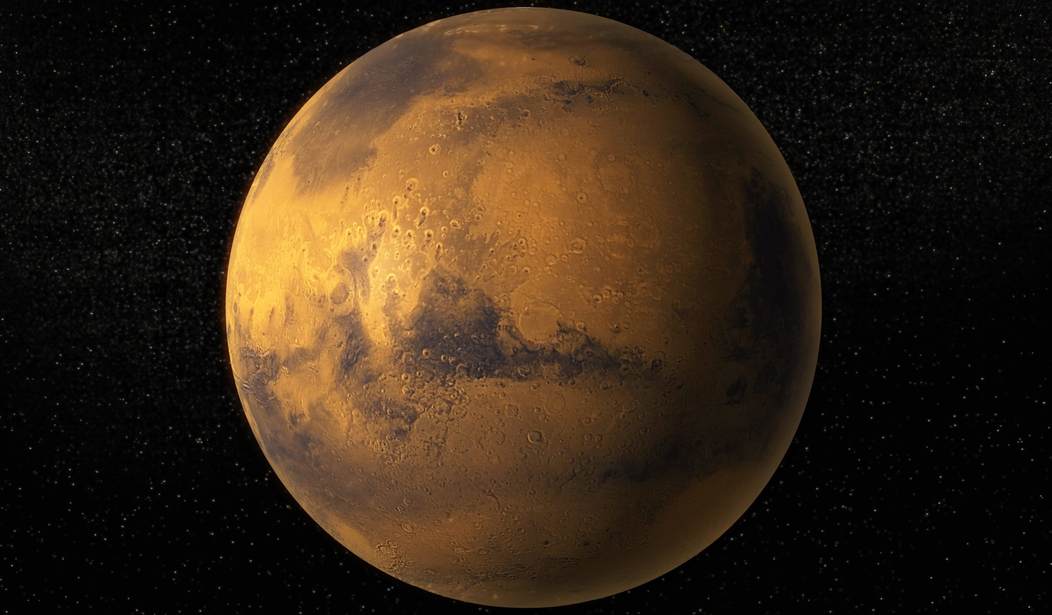On Wednesday, media outlets breathlessly reported that scientists have discovered a “lake of liquid water” on Mars. Fox News called it a “game changer” in the search for alien life, and Yahoo News reported something similar. The New York Times headline spelled out the implications: “Raising the Potential for Alien Life.”
Ph.D. astronomer Hugh Ross told PJ Media that these reports twisted the truth. In reality, the scientists found what could be a lake, but Ross noted that it certainly does not contain life. The peer-reviewed study published in the journal Science, reported on findings from 22 planetary astronomers in Italy working on data from the MARSIS (Mars Advanced Radar for Subsurface and Ionospheric Sounding). The word “lake” is a gross mischaracterization of their tenuous discovery.
“What we found is some kind of sludge, or it could be localized brine pools,” the astronomer Ross, president and founder of Christian apologetics group Reasons to Believe, told PJ Media on Thursday, elaborating on his own article. “That’s a whole lot different than you can take a speedboat on.”
The astronomers used radio waves to discover a small, very bright echo suggesting something underneath Mars’ south polar ice cap. The echo was consistent with the radar reflectivity of liquid water.
Here’s the catch: the “lake” was buried under 1.5 kilometers of ice, the thickest part of the south polar ice cap. The pressure from this ice actually raises the temperature of the likely liquid water layer — to -68°Celsius (-90°Fahrenheit). That’s right, this “water” is liquid at a point far below freezing. “The only way it remains liquid is if it’s super-saturated with perchloric salts,” Ross explained.
“This is not a possible site for life, it’s way too cold and way too salty,” the astronomer told PJ Media. “Even the most extreme forms of life on Earth are not able to handle this much salt and cold.”
That’s not to say the discovery isn’t remarkable. Ross explained that the radar “found a spot that was too bright to be ice or rock — only liquid water would reflect atthhat surface.” The researchers admitted this is an estimate, however — “we can’t prove for sure it’s water.”
As for life on Mars, Ross said scientists will certainly find fossils, but that these fossils and other life remains will be from Earth, not Mars.
“I’ve been on written record since the 1980s,” the astronomer explained. “If we look hard enough, we will find remains of life on Mars. We know that Earth life has been deposited on Mars through meteorite transport.” How does it get there? Meteoroids hitting Earth would dislodge soil, and quite a few of them would have made it all the way to Mars.
But life — at least life like it is on Earth — cannot have ever thrived on Mars, he insisted. While Mars was “much warmer than it is today and much wetter than it is today” back about 4 billion years ago, any liquid water was “ephemeral.”
Ross explained that Mars experienced a “carbonate catastrophe” that destroyed water on Mars. In his book “More than a Theory: Revealing a Testable Model for Creation,” Ross wrote that “the Late Heavy Bombardment 3.85 billion years ago brought a lot of water and carbon dioxide to Mars,” which reacted with Mars’s surface rocks, depleting the Martian atmosphere of carbon dioxide and water. “Thus Mars was swiftly and permanently transformed into a dry, cold wasteland.”
Mars also has an unstable rotation axis, unlike Earth. “If you’ve got a liquid drop of water on the surface of Mars, it evaporates because the freezing point and the boiling point on Mars are the same temperature,” Ross explained. The boiling point of water drops even on high mountains on Earth. “Mars has such a thin atmosphere that water cannot be stable on the surface.”
Even though liquid water may exist on Mars, Ross argued that the search for extraterrestrial life needs to involve more factors. “Water is only one of many requirements for life to be possible. Given how much water there is in the universe, that’s not a good strategy,” he explained. Furthermore, “too much water and too much carbon are a problem for life.”
Earth, which Ross described as a kind of “goldilocks planet,” has about 1200 times less carbon than what is typical for rocky planets of its size.
While Christians mostly doubt the possibility of extraterrestrial life, Ross argued that Bible believers have options on the subject, while atheists do not. “If you come from a perspective that God loves to create and He’s compulsively creative, then aliens are possible. If you take the position that God’ doesn’t waste miracles, this is the only planet.”
“From an atheistic perspective, however, you’ve only got one option — life has got to be everywhere,” Ross quipped.
Ross, who has posited a “testable creation model,” melding scientific theory with Bible interpretation, urged NASA to return to the moon. Referencing the human life remains that made it to Mars, he added, “We know that the moon has received 100 times as much as Mars has.”
“We need to go back to the moon because the moon has the fossils of Earth’s first life,” the astronomer urged. “We can go to the moon and determine who got the life model right: theists or non-theists.”
“That could be a real coup for NASA if they were able to prove who got the origin of life model right,” Ross declared. “I think every taxpayer should be excited about that.”









Join the conversation as a VIP Member